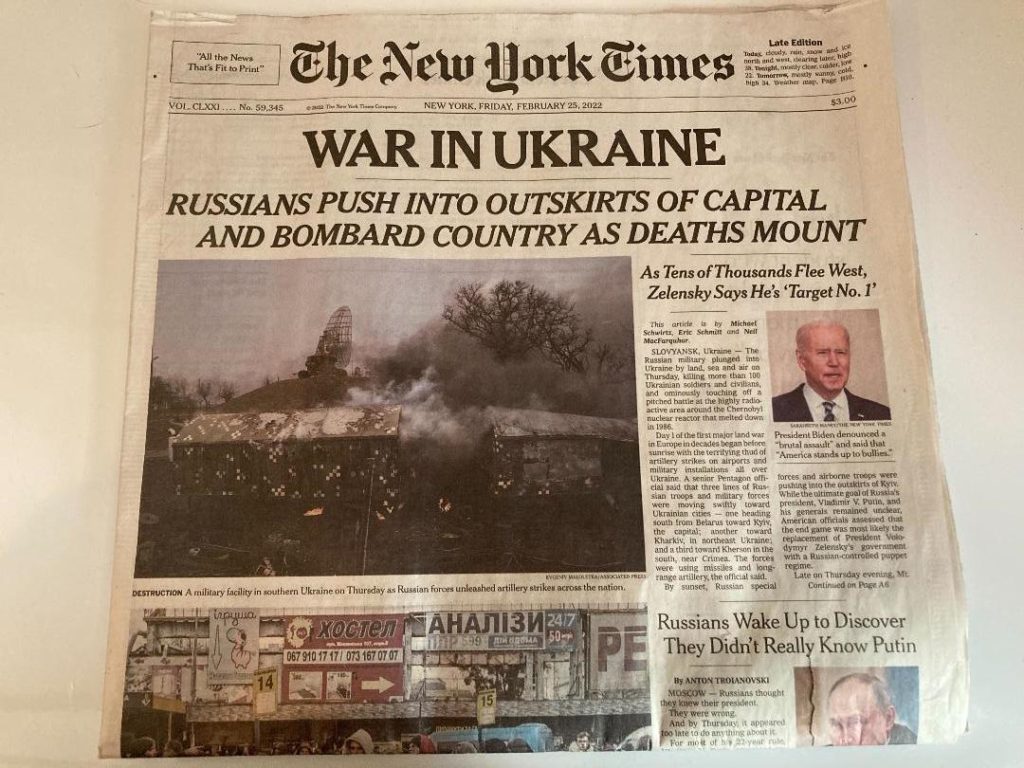
2.28 Jennifer Rubin in the Post: `”We set up a perfectly unified alliance with the singular goal of making Putin pay a crushing economic price and inducing him to abandon his fixation on rebuilding the Russian empire. Our diplomatic work created unprecedented collaboration in the West, collectively imposing formidable sanctions. We overcame the European Union’s usual political timidity and economic self-interest. We used intelligence to show the public how Putin was going to mount his unjustified war. Short of going to war with a nuclear-armed state headed by a deranged dictator, it is hard to think what else we could have done. This is the most effective response to Russian aggression since the Berlin Airlift. Biden should take credit.
2.28 Chris Christie via Twitter: How can anyone with any understanding of the world call Putin’s decision to invade Ukraine “genius” and “very savvy” as we watch him unite the rest of the world against Russia in nearly an instant? Putin has two choices now: an unwinnable occupation of Ukraine after leveling the country and murdering its hero President (if that is even achievable) or a humiliating retreat. Yeah, that’s “genius” and “very savvy” alright. No walking that back. History is watching.
2.28 Franklin Foer in The Atlantic: Yesterday, Zelensky told a videoconference of European leaders that they would likely not ever see him again. The whole world can see that his execution is very likely imminent. What reason does he have to doubt that Vladimir Putin will order his murder, as the Russian leader has done with so many of his bravest critics and enemies? Zelensky’s fate is so clear that Washington offered to extricate him from Kyiv, so that he could form a government in exile. But Zelensky swatted away the promise of safety. He reportedly preferred that Washington deliver him more arms for his resistance: “The fight is here. I need ammunition, not a ride.” . . .In Ukraine, the decision for a leader to flee would be the expected choice. It’s what his predecessor, Viktor Yanukovych, did in the aftermath of the revolution in 2014, leaving behind his palace filled with exotic cars and ostriches for the safety of Moscow. The enduring failure of Ukrainian democracy has been the gap between the code of behavior that applies to the elite and the one that the rest of the country must follow. It’s been the elites who profit off the state, who stash their ill-gotten fortunes in French villas and Cypriot bank accounts, while their compatriots have stagnated. By staying put, Zelensky has erased this gap. There’s no airlift awaiting his fellow residents, so rather than accepting the perk of his position, he’s suffering in the same terror and deprivation that they are forced to endure. A week ago it wasn’t at all obvious that the world would rally to Ukraine’s cause. Nor was it clear that the Ukrainian people would mount a collective resistance to the invasion of their country. There are many reasons why the tide has turned like it has, of course. But it is hard to think of another recent instance in which one human being has defied the collective expectations for his behavior and provided such an inspiring moment of service to the people, clarifying the terms of the conflict through his example.
2.27 Washington Post: As the Russian military pounded targets across Ukraine with an array of bombs and missiles, a small team of Ukrainian border guards on a rocky, desolate island received an ominous message. “I am a Russian warship,” a voice from the invaders said, according to a recording of the communications. “I ask you to lay down your arms and surrender to avoid bloodshed and unnecessary deaths. Otherwise, you will be bombed.” The Ukrainians responded boldly. “Russian warship,” came the reply, “go fuck yourself.” The Russians opened fire, eventually killing 13 border guards. [Later reports suggest the guards may have survived.]
2.27 Bloomberg News: Russians have taken to the streets to protest the war, risking certain imprisonment at the very least. . . . Putin can keep a lid on such dissent for a while, but not forever. Russia’s patience for its wanna-be czar will be increasingly tested as global opprobrium and sanctions wound Russia’s economy. In the end, Putin may find he has won a poisoned chalice. “Russian warship, go f*** yourself” — the defiant words of a Ukrainian soldier defending a tiny island — is the 2022 edition of Flight 93’s “Let’s roll,” a rallying cry for people who won’t be cowed by terrorists. Keeping a country docile and loyal could be impossible for Putin, especially with his economy slowly starving and the world uniting against him.
2.26 Ukrainian woman to Russian soldier: ”You’re occupants! You’re fascists! What the fuck are you doing in our lands with all these guns? Take these seeds and put them in your pockets, so at least sunflowers will grow here when you die.”
2.25 Biden nominates Judge Ketanji Brown Jackson for the Supreme Court
2.25 Nina Khrushcheva on a Vanity Fair podcast: “[Putin}’s a small man of five-six saying he’s five-seven.”
2.25 Thomas L. Friedman in the Times: “”The Russian attempt to seize Ukraine is a throwback to earlier centuries — before the democracy revolutions in America and France — when a European monarch or Russian czar could simply decide that he wanted more territory, that the time was ripe to grab it, and so he did. And everyone in the region knew he would devour as much as he could and there was no global community to stop him. In acting this way today, though, Putin is not only aiming to unilaterally rewrite the rules of the international system that have been in place since World War II — that no nation can just devour the nation next door — he is also out to alter that balance of power that he feels was imposed on Russia after the Cold War. That balance — or imbalance in Putin’s view — was the humiliating equivalent of the Versailles Treaty’s impositions on Germany after World War I. In Russia’s case, it meant Moscow having to swallow NATO’s expansion not only to include the old Eastern European countries that had been part of the Soviet Union’s sphere of influence, like Poland, but even, in principle, states that were part of the Soviet Union itself, like Ukraine. . . .[But] this is not 1945 or 1989. We may be back in the jungle — but today the jungle is wired. It is wired together more intimately than ever before by telecommunications; satellites; trade; the internet; road, rail and air networks; financial markets; and supply chains. So while the drama of war is playing out within the borders of Ukraine, the risks and repercussions of Putin’s invasion are being felt across the globe — even in China, which has good cause to worry about its friend in the Kremlin. Welcome to World War Wired — the first war in a totally interconnected world. This will be the Cossacks meet the World Wide Web. Like I said, you haven’t been here before.”
2.23 Tom Verducci in SI: “In the blink of the last CBA [now expiring], efficiency drained from the game almost 3,000 hits, more than 7,000 balls in play and much of the beauty of the triple, the stolen base and the pitchers’ duel—while adding more than 1,000 pitching changes and 3,000 strikeouts. The traditional equilibrium of the game flipped. A CBA that began with 2,111 more hits than strikeouts ended with 2,661 more strikeouts than hits. Active yielded to passive.”
2.23 Jennifer Rubin in thePost: A poll from Christopher Newport University in Virginia reports, “Voters support teaching how racism continues to impact American society (63% to 33%) and oppose a ban on the teaching of Critical Race Theory in public schools (57% to 35%).” That might explain in part why Virginia Gov. Glenn Youngkin (R), who moved to ban such education, is so unpopular. That poll does not seem to be an outlier. CBS News reports on a poll it conducted with YouGov: “Large majorities — more than eight in 10 — don’t think books should be banned from schools for discussing race and criticizing U.S. history, for depicting slavery in the past or more broadly for political ideas they disagree with.” Whites, Blacks and parents all agree. So do more than 80 percent of Republicans. Moreover, CBS reports, “Four in 10 believe teaching about race in America makes people more racially tolerant today, too, well outpacing the few who think it does the opposite.”
2.22 Members of the U.S. women’s national team reached a settlement with the U.S. Soccer Federation on Tuesday that will guarantee equal pay with the men’s team and offer players millions in back pay, ending a six-year fight in a gender discrimination case that resonated through American sports and beyond. The $24 million settlement, $22 million of which will go to the players behind the suit, was effectively an admission that U.S. Soccer had not paid its women’s team equally.
2.22 Tom McTague in The Atlantic: Trump was supposed to have changed the world, robbing America not just of its luster but of its allies’ trust. Here was a president of such gauche ignorance and hostility, it seemed impossible that American power would ever be seen in the same light again. For Europe, in particular, Trump’s jingoistic belligerence was poised to be an adrenaline shot to the heart, Pulp Fiction–style, jolting the continent out of its American dependency.And yet, here we are, facing the first serious threat of invasion in Europe since the Balkan wars of the 1990s, and it’s as if nothing has changed. The story of the Ukraine crisis so far has been about many things: blackmail; realpolitik; appeasement; even, apparently, Western provocation regardless of the facts. But, here in Europe, the one thing it very much has not been about is American decline. The story of this latest crisis is of the reestablishment of America the Good, America the Bold, America the Supreme—and, by extension, Europe the Weak.
2.22 Tom Nichols in The Atlantic: Putin is now embracing a Russian tradition of paranoia, an inferiority complex that sees Moscow as both a savior of other nations and a victim of great conspiracies, a drama in which Russia is both strong enough to be feared and weak enough to be threatened. The West, in this story, is motivated not to seek peace and security, but to undermine Russia, and Putin has cast himself as the beleaguered Russian prophet who must subvert the evil plans drawn against his people.
2.21 Russia invades Ukraine.
2.21 Jennifer Rubin in the Post: “”What does Putin want? His aims go well beyond Ukraine. As the Atlantic’s Anne Applebaum summarizes: He “wants to put so much strain on Western and democratic institutions, especially the European Union and NATO, that they break up. He wants to keep dictators in power wherever he can, in Syria, Venezuela, and Iran. He wants to undermine America, to shrink American influence, to remove the power of the democracy rhetoric that so many people in his part of the world still associate with America. He wants America itself to fail.” Trump’s foreign policy sought to do much of what Putin wants to achieve, including intimidating Ukraine by withholding vital defensive weapons. Trump, like his role model in Moscow, favored weakening NATO, elevating dictators (from China to Turkey to North Korea to Hungary to Russia), undermining democratic elections, demonizing the media (the best check against power-hungry politicians) and finding common ground with kleptocratic-style governments.”
2.20 Axios: Provocateurs from outside traditional party politics are driving a polarizing new strain of American political conversation. Why it matters: Joe Rogan (14.7 million Instagram followers), Elon Musk (74 million Twitter followers), comedian Dave Chappelle (2.6 million on Instagram) and Barstool Sports founder Dave Portnoy (4 million on Instagram) are some of the most divisive personalities of the Biden era. The Atlantic’s Derek Thompson dubbed these entertainers and pundits “DGAF [don’t give a f***] populists,” noting the same qualities that make them popular “are the qualities that make them a nightmare for publicly traded companies” — Spotify or Netflix. The focus on Trump-era conservative voices, including Alex Jones and Sean Hannity, has shifted to viral voices with appeal on both sides of the aisle. These personalities have gained huge traction in the Biden era by catering to people who feel disillusioned by the mainstream press. The delivery device: podcasts, YouTube videos and newsletters. “[They] are big precisely because they don’t just say ‘no’ to the prevailing discourse,” Saagar Enjeti, host of an anti-establishment YouTube show and a guest on Rogan’s show, tells Axios. “They explicitly say: ‘Screw you.'” After a backlash, these hosts often rebound stronger:Rogan added more Instagram followers in January — after Neil Young pulled his music from Spotify to protest Rogan — than in any other month since 2018, according to CrowdTangle data. Dave Chappelle’s Instagram following jumped 19% — more than the previous nine months combined — in October of last year, after backlash over a Netflix special.
2.20 Allison P. Davis in New York: “Not everyone survives a vibe shift. (What is a vibe shift? In the culture, sometimes things change, and a once-dominant social wavelength starts to feel dated.”) Will you survive it? Will I? I’m not sure, but as we emerge from two years of into a new post-pandemic landscape and economy, I can’t help but feel that the vibe-shift forecasters might be on to something.
 2.20 Cara, Ivy, Ginny and I have lunch at the Sagamore Lodge in Bolton’s Landing.
2.20 Cara, Ivy, Ginny and I have lunch at the Sagamore Lodge in Bolton’s Landing.
2.19 Gary Brooker, who sang and co-wrote Procol Harum’s intoxicating ballad “A Whiter Shade of Pale,” dies at 76.
2.18 Emily Yahr in the Washington Post, reviewing Danielle Lindeman‘s “True Story: What Reality TV Says About Us,”: “An often ridiculed form of entertainment, seemingly marginal to the serious business of life, reality TV is in fact a pop-cultural touchstone that illuminates our everyday experiences and can help us to make sense of complex social forces,” she writes. “The genre is a fun-house mirror, to be sure, but one that powerfully reflects the contours of our social world. It takes the elements that are central to our culture — our collective preferences, our norms and taboos, and the jagged edges of our social inequalities — and beams them out to us in frenetic detail.”. . . . One major theme is that our culture is nowhere near as progressive as some might like to think it is. “While conservative groups would be unlikely to endorse most of these shows, they’re havens for some of the most old-fashioned values that pulse through contemporary American society,” she writes. “They show us how steadfastly we cling to conventional ideas about, for instance, families, marriages, sex, women’s roles, Black bodies, and queer people.” While that may not be shocking, she remarks, “What is surprising, perhaps, is that these often outrageous programs would serve as beacons of our retrograde values.”
2.17 Tara Lipinski on NBC, narrating the chaotic close to the Women’s Figure Skating Competition in the Olympics, in which the favorite Kamila Valieva, the brilliant skater who had failed a drug test, offered a disastrous final performance: “I can’t imagine how tough this has been on Kamila, and it makes me angry that the adults around her weren’t able to make better decisions and guide her and be there for her because she’s the one now dealing with the consequences. And she’s just 15, and that’s not fair. But with that being said, she should not have been allowed to skate in this Olympic event.”
2.17 The percentage of U.S. adults who self-identify as LGBTQ doubled over the past decade to 7.1%, driven by Gen Z’s coming of age, Gallup polling finds. People who identify as LGBTQ could make up 10% to 15% of the adult population “in the not-too-distant future,” says Jeff Jones, author of the Gallup study/ Gen Z adults who identify as LGBTQ have increased from 10.5% in 2017 to 20.8% in 2021. Millennials identifying as LGBTQ increased from 5.8% in 2012 to 10.5% in 2021. Gen Z women are roughly 3x more likely than men to identify as LGBTQ. Millennial women are about 2x more than millennial men to identify as LGBTQ.
2.16 The Financial Stability Board — an international body that brings together regulators from 24 countries and jurisdictions — said that the “fast evolving” crypto market could quickly reach a point where it becomes a “threat to global financial stability” due to its size, structural vulnerabilities and growing ties to the traditional financial system. “Financial stability risks could rapidly escalate,” the group said this week, adding that policymakers needed to step up. “As in the case of the US subprime mortgage crisis, a small amount of known exposure does not necessarily mean a small amount of risk, particularly if there[is] a lack of transparency and insufficient regulatory coverage,” the FSB wrote.
2.16 Thousands of baptisms performed by a priest who served in Arizona for 16 years are now presumed to be invalid because he used incorrect wording in administering the sacrament. The priest said “We baptize you in the name of the Father, and of the Son, and of the Holy Spirit,” when he should have begun the sentence by saying, “I baptize you.”
2.16 Canned
2.15 P.J. O’Rourke dies at 74.
2.14 Alexandra Ocasio-Cortez, quoted in The New Yorker: “Honestly, [Congress] is a shit show. It’s scandalizing, every single day. What is surprising to me is how it never stops being scandalizing. Some folks perhaps get used to it, or desensitized to the many different things that may be broken, but there is so much reliance on this idea that there are adults in the room, and, in some respect, there are. But sometimes to be in a room with some of the most powerful people in the country and see the ways that they make decisions—sometimes they’re just susceptible to groupthink, susceptible to self-delusion.
2.14 Court papers reveal that Trump’s accountant, Mazars, sent a letter on Feb. 9 to the Trump Organization terminating its relationship with Trump. The letter was astounding in many respects. Mazars said that 10 years of Trump’s financial statements, from 2011 to 2020, “should no longer be relied upon,” and that Trump should tell that to the people he gave them to. The accountants explained that they reached this conclusion based upon court filings previously made by the New York attorney general, as well as the accountants’ own investigation and other sources. And then they quit. Under the “totality of the circumstances,” Mazars wrote, “we have also reached the point such that there is a non-waivable conflict of interest with the Trump Organization. As a result, we are not able to provide any new work product to the Trump Organization.” George Conway: “By “totality of the circumstances,” they likely meant, The prosecutors investigating you, and the case they’re making, are serious. By pronouncing “a non-waivable conflict of interest,” they were all but saying, We’re on team A.G. — or we might have to join someday soon. And by saying no “new work product” and quitting, they essentially declared, We don’t trust you — and we’re certainly not going to jail for you.“
2.14 Axios: Challenger, Gray & Christmas, the outplacement firm, estimates the U.S. could lose $3.5 billion in productivity from people skipping work today — $6.5 billion if you count employees who show up but spend a couple hours gabbing.
2.13 In the Super Bowl, the Rams beat the Bengals 23-20.
2.9 Marjorie Taylor Greene, on the One America News show “Real America with Dan Ball”: “Not only do we have the D.C. jail which is the DC gulag, but we have Nancy Pelosi’s gazpacho police spying on members of Congress.”
2.9 Peter Navarro in an email quoted in the New York Times: “Pence betrayed Trump. Marc Short is a Koch Network dog. Meadows is a fool and a coward. Cheney and Kinzinger are useful idiots for Nancy Pelosi and the woke Left.”
2.8 Mitch McConnell: “Let me give you my view on what happened on Jan. 6. We were all here. It was a violent insurrection for the purpose of trying to prevent the peaceful transfer of power after a legitimately certified election.”
2.6 Chris Christie on ABC’s The Week: “Let’s face it. Let’s call it what it is. Jan. 6 was a riot that was incited by Donald Trump in an effort to intimidate Mike Pence and the Congress into doing exactly what he said in his own words last week: Overturn the election. , , ,He actually told the truth by accident. He wanted the election to be overturned.”
2.5 Jeremy W. Peters, in his forthcoming book, “Insurgency: How Republicans Lost Their Party and Got Everything They Ever Wanted”, as reported in Axios: “Mark Salter, a longtime aide to McCain, cautioned him that voters could see a Palin pick as discordant with the message of readiness and experience that the campaign had been focusing on as a contrast with Obama, a forty-seven-year-old first-term senator. ‘There’s worse things, John, than losing an election. You could lose your reputation,’ Salter told him.” Steve Schmidt, a top campaign strategist often blamed for pushing Palin, “also thought Palin was a risk but said maybe it was one worth taking,” Peters writes:[Schmidt] told McCain he should consider whether it would be worth it if he chose Palin and lost, but also knew in the end that he’d lost because he did something bold. “What you’ve got to decide,” Schmidt told the senator, “is would you rather lose by seven going for it?”McCain turned to his wife, Cindy. “John, it’s a gamble,” she said. This made McCain’s face light up. “Well, I wish you hadn’t said that,” he said. McCain, an avid craps player, balled up his fist and blew on it, then shook it like he was about to roll a pair of dice. “Fuck it,” he said. “Let’s do it.”

 2.5 Shawn and I head to a frigid Glen’s Falls to see the Adirondack Thunder defeat the Fort Wayne Komets 4-3. The guys were very fast skaters. I was amused by the advertising opportunities–
2.5 Shawn and I head to a frigid Glen’s Falls to see the Adirondack Thunder defeat the Fort Wayne Komets 4-3. The guys were very fast skaters. I was amused by the advertising opportunities–"Another Queensbury Hotel Icccccing!'' “Another Old School Pest Control Penalty Kill!.” Loud!
2.4 Pence, in a speech before the Federalist Society” “This week, President Trump said I had the right to ‘overturn the election.’ But President Trump is wrong. I had no right to overturn the election. Frankly there is no idea more un-American than the notion that any one person could choose the American president.”
2.4 The Republican National Committee censured Representatives Cheney and Kinzinger, in part for “”participating in a Democrat-led
persecution of ordinary citizens engaged in legitimate political discourse”–namely, the riot at the Capitol and other efforts to overturn the election. Sen. Mitt Romney on Twitter: “Shame falls on a party that would censure persons of conscience, who seek truth in the face of vitriol.”
2.2 Robin Herman dies at 70.
2.2 Charlie Sykes in The Bulwark: “For all their many faults, Pence, Barr, and even Giuliani came from a different era of American politics, with lingering (and rapidly fading) memories of the rule of law and a (more or less) decent respect for the opinions of mankind. But in a second Trump term, they won’t be there. It will be all Kayleighs, Bannons, Epshteyns, McEntees, Bonginos, D’Souzas, and Stephen Millers. So consider this: In Trump 2.0, we may look back on Bill Barr, Mike Pence, and — God forgive me — Rudy Giuliani with a certain sense of nostalgia, because where are those lines now?”
2.2 The Washington Football Team becomes the Washington Commanders.
2.2 US national debt topped $30 trillion
2.1 Tom Brady retires. Brady: “To my mind, it’s not what people do in their 20s that leads to greatness, or a lasting legacy. It’s what they keep doing, year after year, at a consistently high level.”


